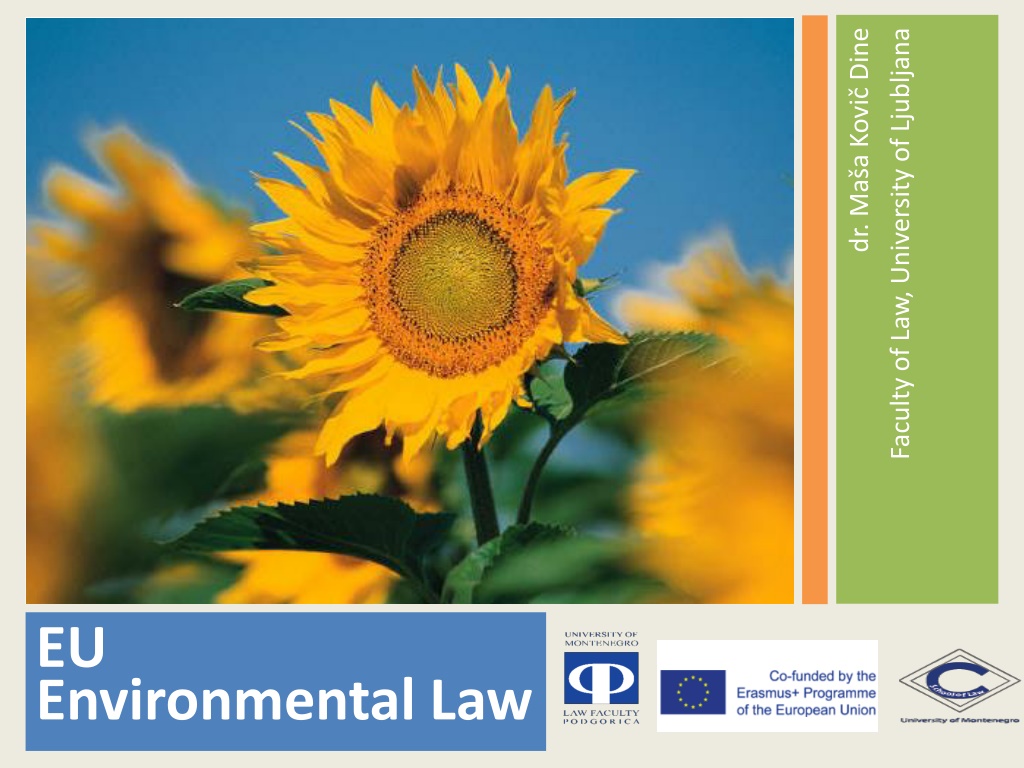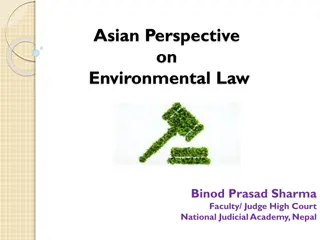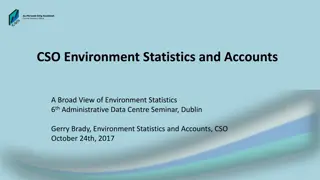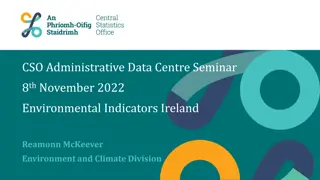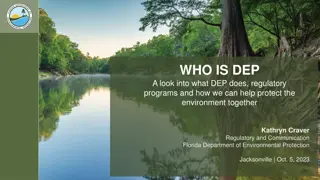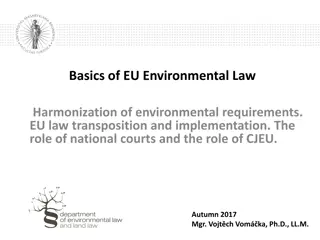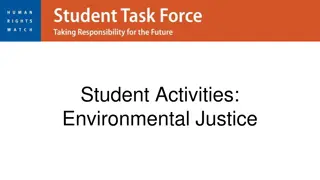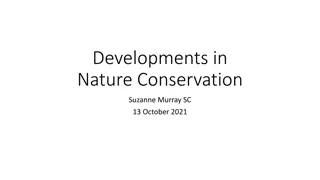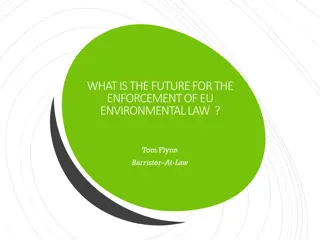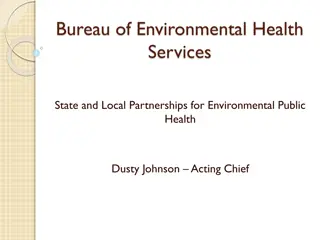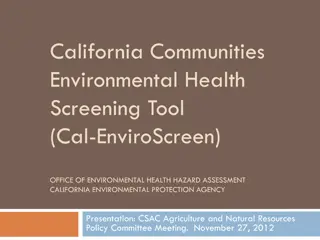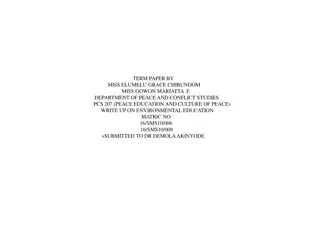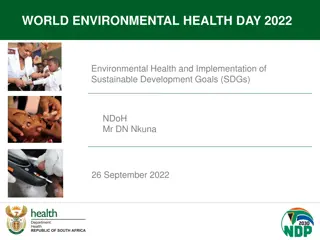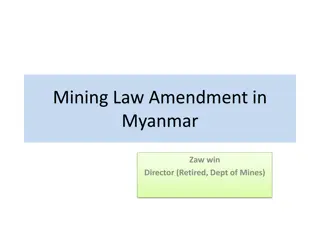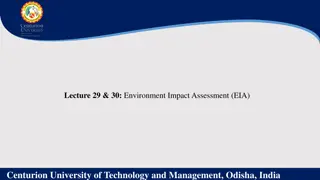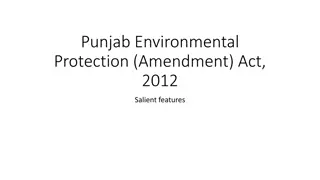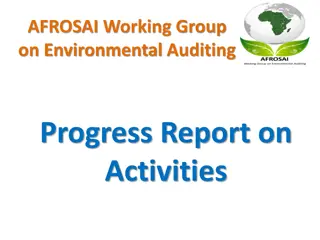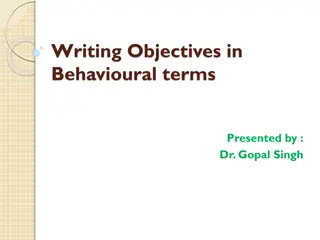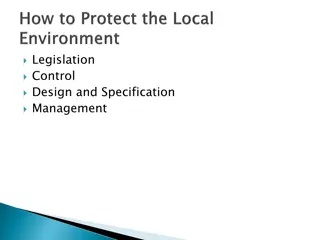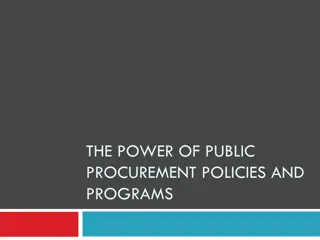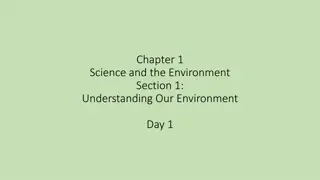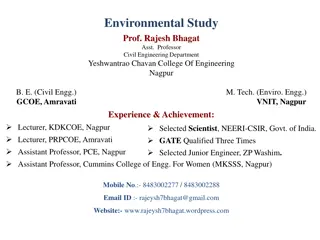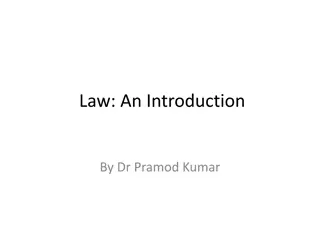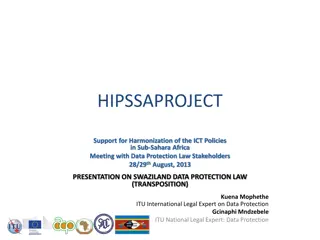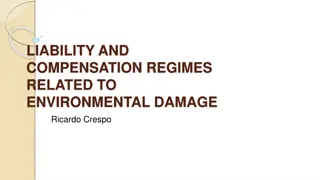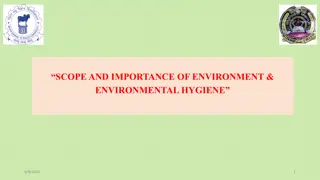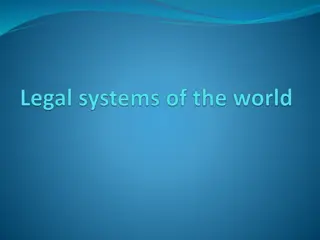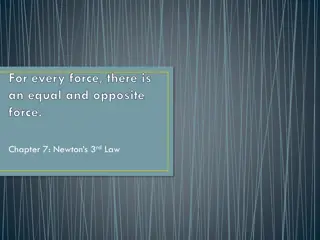Overview of EU Environmental Law and Objectives
Dr. Maa Kovi Dine, a Faculty of Law member at the University of Ljubljana, specializes in EU Environmental Law. The European Union aims to establish an internal market while ensuring balanced economic growth, environmental protection, and social progress. EU has exclusive, shared, and supportive competencies in environmental matters, focusing on areas such as marine biological resources. The Union's environmental policy includes preserving the environment, protecting human health, and promoting sustainable use of natural resources at an international level.
- EU Environmental Law
- Dr. Maa Kovi Dine
- University of Ljubljana
- Environmental Protection
- European Union
Download Presentation

Please find below an Image/Link to download the presentation.
The content on the website is provided AS IS for your information and personal use only. It may not be sold, licensed, or shared on other websites without obtaining consent from the author. Download presentation by click this link. If you encounter any issues during the download, it is possible that the publisher has removed the file from their server.
E N D
Presentation Transcript
dr. Maa Kovi Dine Faculty of Law, University of Ljubljana EU Environmental Law
Objectives of EU environmental protection 3rdparagraph Article 3 TEU: The Union shall establish an internal market. It shall work for the development based on balanced economic growth and price stability, a highly competitive market economy, aiming at full employment and social progress, and a high level of protection improvement of the quality of the environment. It shall promote scientific technological advance. sustainable of Europe social and and
Exclusive competence: marine biological resources (common fisheries policy Art. 3(1)(d) TFEU) Shared competence: environment Art. 4(2)(e) TFEU EU competence in environmental matters then click the placeholders to add your own pictures and captions. Supportive competence: protection and improvement of human health Art. 6(a) TFEU
Art. 193 TFEU The adopted pursuant to Article 192 shall not prevent any Member State from maintaining introducing more protective measures. measures must be compatible with the Treaties. They shall be notified to the Commission. protective measures or stringent Such
Sources of EU Environmental Law Primary: Treaty on the European Union, Treaty on the Functioning of the European Union, Charter of Fundamental Rights of the European Union International law obligations (mixed agreements) Secondary: numerous regulation, directives and decision ECJ case-law Environmental Action Programmes
Art. 191 TFEU 1. Union policy on the environment shall contribute to pursuit of the following objectives: - preserving, protecting and improving the quality of the environment, - protecting human health, - prudent and rational utilization of natural resources, - promoting measures at international level to deal with regional or worldwide environmental problems, and in particular combating climate change. 2. Union policy on the environment shall aim at a high level of protection taking into account the diversity of situations in the various regions of the Union. It shall be based on the precautionary principle and on the principles that preventive action should be taken, that environmental damage should as a priority be rectified at source and that the polluter should pay. In this context, harmonization measures answering environmental protection requirements shall include, where appropriate, a safeguard clause allowing Member States to take provisional measures, for non-economic environmental reasons, subject to a procedure of inspection by the Union.
Art. 191 TFEU - continuation 3. In preparing its policy on the environment, the Union shall take account of: - available scientific and technical data, - environmental conditions in the various regions of the Union, - the potential benefits and costs of action or lack of action, - the economic and social development of the Union as a whole and the balanced development of its regions. 4. Within their respective spheres of competence, the Union and the Member States shall cooperate with third countries and with the competent international organizations. The arrangements for Union cooperation may be the subject of agreements between the Union and the third parties concerned. The previous subparagraph shall be without prejudice to Member States' competence to negotiate in international bodies and to conclude international agreements.
Art. 11 TFEU Environmental protection requirements must be integrated definition implementation of the Union's policies and activities, in particular with a promoting sustainable development. into the and view to
Principles of EU environmental law General EU principles Subsidiarity Proportionality Integration Sustainable development EU environmental law substantive principles Precautionary Prevention Rectification at source Polluter pays principle EU environmental law procedural principles Access to information Participation in decision-making Access to justice
Precautionary Principle = lack of full scientific certainty shall not be used as a reason for postponing measures Food law and protection of health Confirmed by ECJ> BSF (1996) an export ban on beef Limitation of the principle: Risk adequately backed up by scientific data (Pfizer) A tool for risk assessment (adverse effects, scientific data available, extent of scientific uncertainty) Action has to be proportionate, non-discriminatory, consistent, based on examination of the benefits and costs, subject to examination of scientific development
Prevention Principle = prevent a risk that exists, is known and likely to occur Waste and pollution legislation Assessment of the probability and extent of damage and the cost-benefit analysis Environmental Impact Assessment
Principle of Rectification of damage at source = correct damage that occurred At the very early stage ECJ > Commission v. Belgium (C-2/90): reduction of transportation of hazardous waste Requirement of setting up standards (exp.: for emissions)
Polluter Pays Principle Internalization of pollution costs Price on pollution Waste management Setting standards > setting charges when breached (giving an economic value to pollution)
Actors of EU environmental law making EU parliament Council of the European Union European Commission Court of Justice Committee of the Regions and the Economic and Social Committee Other: European Environmental Agency, European Investment Bank, European Marine Safety Agency, European Chemicals Agency
Environmental Impact Assessment Directive 2014/52 o the assessment of the effects of certain public and private projects on the environment (EIA Directive) Likely to have significant effects on the environment Project = execution of construction works or of other installations or schemes, as well as other installations, in the natural surroundings and landscape including those involving the extraction of mineral resources (Art. 1(2)(a)) Art. 8 defines which information has to be included in the assessment Art. 11 determines access to public Strategic Environmental Impact Assessment Directive 2001/42/EC on the assessment of the effects of certain plans and programmes on the environment (SEA Directive) Strategic plans and programs prepared in a way to enable EIA of projects defined therein
UNECE Convention on Access to Information, Public Participation in Decision- Making and Access to Justice in Environmental Matters - Aarhus Convention (1998) Access to information Participation in decision-making Access to justice Procedural principles
Access to environmental information Directive 2003/4 on access to environmental information Anyone performing public administrative functions has the duty to provide information Within 1-2 month Refusal of access: confidential, industry, IPR, personal data, public security or national defense No interest required Free of charge or at least reasonable
Participation in decision-making Directive 2003/35 on public participation in respect of the drawing of certain plans and programmes relating to the environment Early and effective opportunities to participate with reasonable timeframes No interest Environmental impact assessment
Access to justice Challenge violations of substantive environmental law Challenge public decisions that have been made in contravention of the access to information and participation in decision-making National/MS courts Communication to the EC for violation of EU law > Commission instigates proceedings before the ECJ Complaint to the Aarhus Convention Compliance Committee for violation of the Aarhus Convention Application before the European Court of Human Rights for violation of ECHR
Thank you! masa.kovic-dine@pf.uni-lj.si
